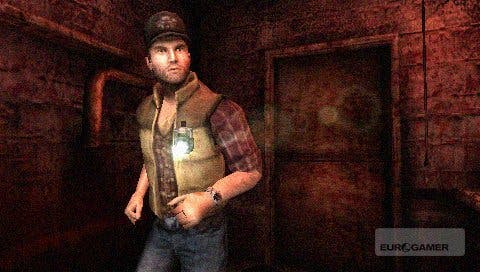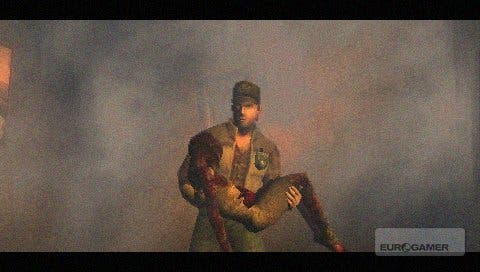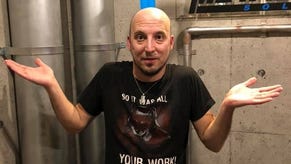Silent Hill Origins
The root of all evil.
Do you remember the first time a piece of fiction - a film, a book, a game - made you genuinely, horribly afraid? Everyone is afraid of something, and for each fear there's a fiction which touches precisely on that most primal of instincts, twanging unsettlingly on the strings that make even us hardy grown-ups wonder, just for a moment, if we really are alone in the dark.
In my childhood, for example, there were some brushes with frightening movies. An all-too-young viewing of Arachnophobia managed, ironically, to turn a childhood fascination with creepy-crawlies into a screaming terror of hairy beasties with altogether too many legs which has lasted into my twenties, while The Omen left me with broadly the same response to priests, bishops, organised religion and posh children.
But by the age of about 16, I was pretty much past that; unflappable in the face of the cheap scares and shocks which movies and games of the time could muster. That self-confidence and certainty is probably, in retrospect, a major part of why Silent Hill was such a shot to the gut. Beautiful, disturbing, melancholy, eerie, inexplicable and overwhelmingly terrifying, Silent Hill opened a dreamlike world of nightmares. I slept with the bedside light on for several days, although I could never have told you exactly why.
That was the first time Silent Hill scared me. The most recent incident was very different - about as different as you can imagine, really. It took place on a train to Portsmouth on one of those astonishingly wet July mornings we've been having of late. I was on my way to see the next instalment in the series, Silent Hill Origins, at developer Climax' studio near the harbour - and the fear? Simple. I was afraid that the game I was about to see would be really, really bad.
You're Not Here

Now, on one level, it's the job of the journalist to be a cynic - but I'll confess to approaching Origins with something less than the full proportion of professional detachment. This is the first Silent Hill to be developed outside Konami's Japanese studios, eight time-zones and half a world away from the hive mind at Team Silent. On top of that, the game has had a rather interesting development history - a history patchy enough to give any Silent Hill fan a furrowed brow.
Originally envisaged as a remake of the first Silent Hill game for the PSP, and designed to tie in with the Christophe Gans helmed movie, Origins later became an entirely new game set seven years before the events of Silent Hill. Early glimpses, however, suggested that the game would be more heavily action focused than its predecessors. A Resident Evil 4 style over-shoulder camera was revealed in screenshots, and it was strongly hinted that the core gameplay would be much more physical and combat-centric than Silent Hill fans are accustomed to.
It sounded, in other words, like the very basis of what makes people love Silent Hill had been overlooked. Silent Hill isn't about fighting monsters. It's about the oppressive atmosphere, the sense of being near-helpless in the face of vast, incomprehensible forces, the beautifully composed characters sketched across understated, perfectly formed stories.
Development shifted around. Rumours of mismanaged schedules flew as the original team was disbanded, and the project crossed the Atlantic and landed in Portsmouth. The Resident Evil 4 influenced camera angle is gone; Silent Hill Origins has, fittingly, returned to Silent Hill's origins. But with talk of such a troubled path through development running around my head, I was steeled for disappointment.

In retrospect, I should have had a little more faith - in the capacity of talented developers to learn bloody quickly, if nothing else. The team in Portsmouth working on Silent Hill Origins has already seen one team of fellow developers try to turn the franchise into an action game, and watched them being broken mercilessly upon the harsh rocks of fan response. It would be disingenuous to suggest that the outcry at Origins' early public airings directly led to the abandonment of the US team's efforts; it would be equally disingenuous, we suspect, to suggest that it had no bearing whatsoever on the decision.
As a result, the team in Portsmouth oozes respect for the Silent Hill franchise from every pore. Team Silent, strongly rumoured to be beavering away in Japan on Silent Hill 5, were carefully consulted about keeping the story canonical - "somewhere, deep in the heart of Konami's headquarters in Japan, there's a book entirely bound in human skin which contains the entire storyline of Silent Hill," jokes game director Mark Simmons. ("I thought it was split into 30 pieces and tattooed on the bodies of 30 different men," responds producer William Oertel.)
Perhaps more importantly, the team have also consulted deeply with the most important reference of all - the previous games in the franchise. In doing so, they have dragged the game right back to the basics of how Silent Hill works, and why we love it. Rather than innovation for the sake of innovation (or innovation for the sake of hanging off Capcom's coat-tails), the build of Silent Hill Origins we got to play showed off more subtle, welcome innovation - much of it focused on making Silent Hill work on a handheld, rather than on trying to fix unbroken game mechanics.




.png?width=291&height=164&fit=crop&quality=80&format=jpg&auto=webp)




.jpg?width=291&height=164&fit=crop&quality=80&format=jpg&auto=webp)
